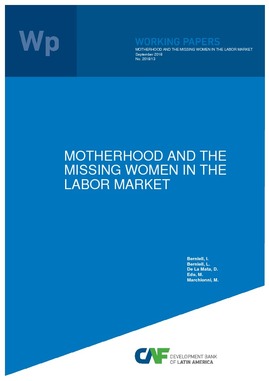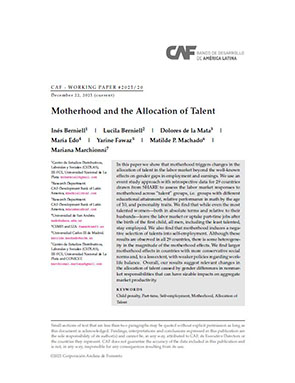Mostrar el registro sencillo del ítem
Motherhood and the missing women in the labor market
| dc.contributor.author | Berniell, I | |
| dc.contributor.author | Berniell, Lucila | |
| dc.contributor.author | de la Mata, Dolores | |
| dc.contributor.author | Edo, M | |
| dc.contributor.author | Marchionni, M | |
| dc.coverage.spatial | Chile | es_ES |
| dc.coverage.spatial | Estados Unidos | es_ES |
| dc.coverage.spatial | Europa | es_ES |
| dc.date.accessioned | 2018-09-06T21:43:13Z | |
| dc.date.available | 2018-09-06T21:43:13Z | |
| dc.date.issued | 2018-09-06 | |
| dc.identifier.citation | Berniell, I., Berniell, L., de la Mata, D., Edo, M., & Marchionni, M. (2018, September 6). Motherhood and the missing women in the labor market. Caracas: CAF. Retrieved from https://scioteca.caf.com/handle/123456789/1259 | en_GB |
| dc.identifier.uri | https://scioteca.caf.com/handle/123456789/1259 | |
| dc.description.tableofcontents | Motherhood currently stands out as a key determinant of the gender gap in labor market outcomes. Studies identifying the effect of children have mostly focused in Europe and the US. These results may not be extrapolated to developing countries with different institutional settings and cultural norms. In this paper we estimate the impact of becoming a mother on various labor outcomes in Chile. Following an event-study methodology we show that motherhood implies a drastic reduction in earnings, explained by a drop in labor supply, both in the extensive and intensive margins. These changes persist even ten years after the first child is born. No child penalties are found for fathers, neither in the short nor in the long run. The results for mothers are driven by a decline in formal employment, leading to an increase in informality rates among them. Finally, we find that effects are stronger for less educated mothers, indicating that education is a buffer for this type of child penalty. Our results suggest that mothers find in the informal sector the flexibility to cope with both family and labor responsibilities, although at the cost of resigning contributory social protection and reducing on-the-job skills accumulation. | es_ES |
| dc.language.iso | en_US | es_ES |
| dc.publisher | CAF | es_ES |
| dc.subject | Economía | es_ES |
| dc.subject | Educación | es_ES |
| dc.subject | Investigación socioeconómica | es_ES |
| dc.subject | Mujer | es_ES |
| dc.subject | Niñez | es_ES |
| dc.title | Motherhood and the missing women in the labor market | es_ES |
| dc.type | workingPaper | es_ES |
| dc.publisher.city | Caracas | es_ES |
Ficheros en el ítem
Este ítem aparece en la(s) siguiente(s) colección(ones)
-
6.1 Documentos de trabajo en investigación socioeconómica
En esta colección se encuentran los documentos de trabajo sobre temas económicos y sociales prioritarios para la región.




